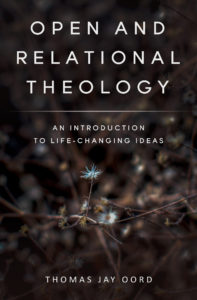God’s Power in Open and Relational Theology
Open and relational theology says we best understand God’s power in ways consistent with our experiences and the world. It draws from scriptural stories and passages that speak of God acting without controlling others.
In Open and Relational Theology: An Introduction to Life-Changing Ideas, I explore how open and relational advocates think about God’s power.
God’s Power and Love
Many open and relational thinkers use the logic of love to make sense of what God can and can’t do. If we think love does not manipulate, for instance, we should remove “manipulation” from activities God does. Or if our experience of freedom suggests God must not control, we remove “overrides freedom” from divine activities. If we think a loving God who could prevent evil would, we remove “God prevents evil singlehandedly” from activities God does. If we think love doesn’t abuse, torture, or sell children into slavery, we take those activities off the list of things God does or wants from others. And so on.
Open and relational scholars use sophisticated arguments to explain their views. They draw from scriptures, philosophy, experience, and more. Most of this work occurs at academic conferences, in scholarly books, or on websites dedicated to complex ideas. To explore them, check out those resources at the conclusion of this book.
An open, relational, and loving God acts but does not control.
Power Proposals
“But why is God’s power relational and persuasive?” we might ask.
Some open and relational theologians think that after creating the universe, God chose to self-limit. Out of love, says this view, God gives freedom and agency to creatures, metaphorically withdrawing to allow them autonomous choice. I call this “voluntary divine self-limitation.”
Others think metaphysical laws or the God-world relationship prevent God from controlling. In this view, God isn’t choosing to be persuasive; persuasion is built into the structures of existence. God can’t unilaterally determine others, because it’s impossible.
Still others appeal to the logic of free will. For them, God can’t simultaneously grant freedom and not grant it. That’s not logical. Giving free will means God can’t control those to whom the gift is given. These free agents might include people, animals, birds, angels, demons, or more. A God who gives freedom can’t control what happens.
My View of God’s Power
My view says God can’t control, because uncontrolling love comes first in God’s unchanging nature. Because God can’t deny the divine nature, God can’t control anyone or anything.
As I see it, outside forces or factors don’t constrain God. Nor does God voluntarily self-limit. God necessarily expresses self-giving and others-empowering love, because that’s what divine love does. I call this “the uncontrolling love of God” or the “essential kenosis” view. I have explained my views in various books.[i]
An Open and Relational God Acts
None of the views I’ve listed says God is absent from our lives or the world. Open and relational thinkers don’t believe God sits on Mars eating popcorn, uninvolved in the affairs of planet earth. God isn’t sitting in the upper deck watching the ballgame below.
These views also reject a “do-nothing” God. God isn’t a couch potato who eats your ice cream but never helps to clean the house. The Creator and Sustainer is more than the glue of the universe, more than a noninteractive Ground of Being. God is active rather than inert.
God is a universal agent who acts directly in relation to creation, without controlling.
Notice also that open and relational thinkers offer proposals about how God really acts. They aren’t saying, “God’s ways aren’t anything like ours.” Instead of a mysterious black box, they propose understandable models to describe divine activity. They use analogies connected to creaturely action.
(The previous is an excerpt from Open and Relational Theology.)
[i] See my books God Can’t: How to Believe in God and Love after Tragedy, Abuse, and Other Evils (SacraSage 2019) and The Uncontrolling Love of God (IVP Academic, 2015).


Comments
I am finding your theology intriguing (have background in process theology) but have a question. If God is love and created the universe , why /how did natural (not human caused) disasters come to be?
Great question, Ellen! I think natural disasters are the product of a creation with randomness and agency given by God as Creator. And I think God’s love is uncontrolling even among nonhuman creation. So God can’t prevent natural evil singlehandedly.